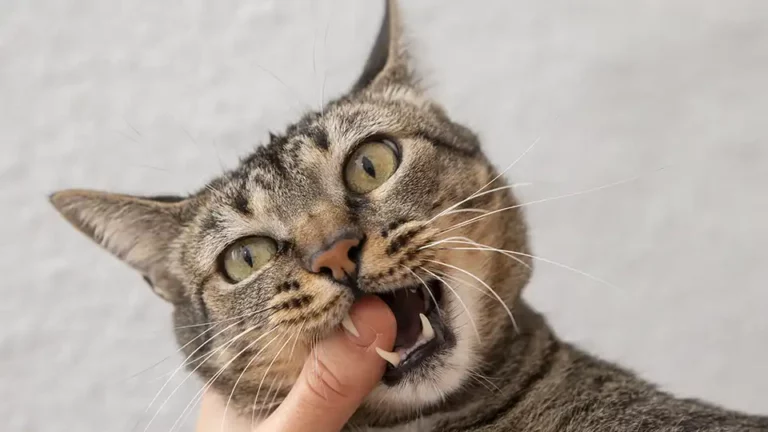
Cats are known for their quirky behaviors and endearing ways of showing affection. One such behavior that often puzzles and sometimes concerns cat owners is the notorious “love bite.” These playful nibbles, while usually harmless, can occasionally escalate into something more problematic. If you’ve ever found yourself wondering how to respond when your cat’s love bites go too far, you’re not alone. In this guide, we’ll explore why cats bite, how to distinguish between playful nips and aggressive bites, and what you can do to manage and mitigate this behavior effectively.
Understanding Cat Love Bites
What Are Love Bites?
Love bites are a form of feline communication where your cat uses its teeth to express affection or playfulness. Unlike aggressive bites, which are typically driven by fear or territoriality, love bites are usually meant to be gentle and playful. However, these bites can sometimes become more intense or frequent, leading to confusion and concern for cat owners.
Why Do Cats Give Love Bites?
Cats may give love bites for several reasons:
- Playfulness: Cats, especially kittens, use their mouths during play. This can sometimes translate into affectionate nibbles when they’re interacting with their favorite humans.
- Overstimulation: Sometimes, what starts as affectionate petting can become overstimulating for your cat, leading them to bite as a way to signal they’ve had enough.
- Bonding: In the wild, cats use gentle biting as a way to strengthen social bonds. Your cat may be trying to bond with you in the same way.
Differentiating Between Love Bites and Aggressive Bites
It’s crucial to recognize the difference between love bites and aggressive bites:
- Love Bites: These are usually gentle and accompanied by purring or relaxed body language. They might be quick and are often followed by affectionate behavior like headbutting or kneading.
- Aggressive Bites: Aggressive bites are often more forceful and can be accompanied by signs of aggression such as flattened ears, a puffed-up tail, or hissing.
When Love Bites Go Too Far
Signs Your Cat’s Bites Might Be a Problem
While love bites are generally harmless, there are signs that they might be becoming problematic:
- Increased Frequency: If your cat is biting you more often than usual, it might be a sign that they’re feeling stressed or overstimulated.
- Increased Intensity: If the bites become harder or draw blood, it’s important to address the behavior to avoid potential injury.
- Behavioral Changes: Sudden changes in your cat’s behavior, such as aggression or withdrawal, can indicate that something is wrong.
Why Might Love Bites Escalate?
Several factors can contribute to an increase in love bites:
- Health Issues: Sometimes, health problems or discomfort can cause changes in behavior. If your cat is biting more frequently or aggressively, a visit to the vet might be in order.
- Environmental Changes: Changes in the environment, such as a new pet or a move, can stress your cat and lead to increased biting.
- Lack of Stimulation: Boredom or lack of physical and mental stimulation can lead to excessive biting as a way for your cat to entertain themselves.
Managing and Preventing Excessive Love Bites
Establish Boundaries
One effective way to manage love bites is to establish clear boundaries with your cat:
- Redirection: If your cat starts to bite during play or petting, gently redirect their attention to a toy or scratch post.
- Avoid Overstimulation: Pay attention to your cat’s body language and stop petting or playing before they become overstimulated.
Use Positive Reinforcement
Encouraging good behavior through positive reinforcement can help reduce the frequency of love bites:
- Reward Calm Behavior: Use treats or praise to reward your cat when they interact gently.
- Consistency is Key: Be consistent in your responses to biting. If you react differently each time, it can confuse your cat and make the behavior worse.
Provide Alternatives
Offering your cat alternatives for their biting urges can be beneficial:
- Interactive Toys: Provide a variety of toys to keep your cat entertained and engaged.
- Scratching Posts: Invest in high-quality scratching posts and pads to help your cat satisfy their natural instincts.
Seek Professional Help
If your cat’s love bites become problematic despite your best efforts, consider seeking help from a professional:
- Veterinarian: Rule out any underlying health issues that might be contributing to the behavior.
- Animal Behaviorist: A professional can provide tailored advice and strategies for managing and modifying your cat’s behavior.
Conclusion
Understanding and managing your cat’s love bites requires patience, observation, and a bit of strategy. By recognizing the signs of excessive biting, differentiating between playful and aggressive behavior, and implementing effective management techniques, you can help ensure that your interactions with your feline friend remain positive and enjoyable. Remember, love bites are usually a sign of affection, but if they start to cross the line, there are plenty of steps you can take to address the issue and maintain a healthy and happy relationship with your cat.